| Srl | Item |
| 1 |
ID:
123651
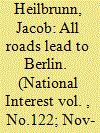

|
|
|
|
|
| Publication |
2012.
|
| Summary/Abstract |
BACK IN November 2011, as Europe struggled with its ongoing financial crisis, Poland's foreign minister, Radek Sikorski, gave a speech in Berlin that beckoned toward his country's western neighbor and pleaded with it to save the euro. "You know full well that nobody else can do it," said Sikorski. "I will probably be the first Polish foreign minister in history to say so, but here it is: I fear German power less than I am beginning to fear German inactivity. You have become Europe's indispensable nation."
|
|
|
|
|
|
|
|
|
|
|
|
|
|
|
|
| 2 |
ID:
142834
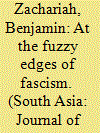

|
|
|
|
|
| Summary/Abstract |
The genealogies of völkisch ideas everywhere would suggest that they were relatively widespread in a world thinking about defining the nature of nationalism. The idea of the Volk has its origins, of course, in German romanticist imaginings of the German nation. The glorification of an ‘Aryan’ past in India, the identification of the ‘folk element’, or a connection with sacred soil and sacred space, shared the same building blocks of romantic nationalism that were evident across the world. This essay focuses on Indian völkisch nationalism through the work and career of Benoy Kumar Sarkar, his engagements with German and Indian ideas, his ability to translate them across their specific contexts and his institutional linkages.
|
|
|
|
|
|
|
|
|
|
|
|
|
|
|
|
| 3 |
ID:
111800
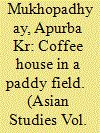

|
|
|
| 4 |
ID:
105967
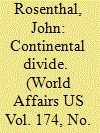

|
|
|
| 5 |
ID:
093749
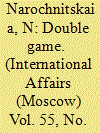

|
|
|
|
|
| Publication |
2009.
|
| Summary/Abstract |
SO FAR HISTORIANS AND POLITICAL SCIENTISTS have failed to arrive at a more or less concerted opinion about World War II, which marked a turning point in the history of the 20th century. In recent years, the discussion has spilled beyond academic frameworks. It means that new eloquent facts and documents are no longer enough to uphold one's opinion: the entire ideological concept the Western experts apply when dealing with the events and evidence of the 1930s-1940s should be refuted.
|
|
|
|
|
|
|
|
|
|
|
|
|
|
|
|
| 6 |
ID:
157412
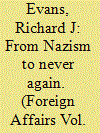

|
|
|
|
|
| Summary/Abstract |
Defeated regimes are not only swiftly removed from power but often immediately erased from memory as well. When Adolf Hitler’s “thousand-year German Reich” came crashing down in 1945 with the Allied victory in World War II, reminders of the 12 years of its actual existence were hastily scrubbed away as Germans scrambled to adjust to life after Nazism. Stone swastikas were chiseled off the façades of buildings, Nazi insignia were taken down from flagpoles, and, in towns and cities across Germany, streets and squares named after Hitler reverted to their previous designations.
|
|
|
|
|
|
|
|
|
|
|
|
|
|
|
|
| 7 |
ID:
189803
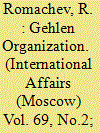

|
|
|
|
|
| Summary/Abstract |
GERMANY'S intelligence establishment has come a long way in its 130 years of formation. Its history began with the secret police agency of the Hohenzollern empire, which was succeeded by the Abwehr (counterintelligence service) of the Weimar Republic. The Federal Intelligence Service (Bundesnachrichtendienst, BND), Germany's current foreign intelligence agency, was founded in 1956 and is reputed to be one of the world's best intelligence services.
|
|
|
|
|
|
|
|
|
|
|
|
|
|
|
|
| 8 |
ID:
032800
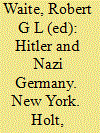

|
|
|
|
|
| Publication |
New York, Holt, Rinehant & Winston, 1969.
|
| Description |
122p.
|
| Series |
European problem studies
|
|
|
|
|
|
|
|
|
|
|
|
Copies: C:1/I:0,R:0,Q:0
Circulation
| Accession# | Call# | Current Location | Status | Policy | Location |
| 008807 | 320.5330943/WAI 008807 | Main | On Shelf | General | |
|
|
|
|
| 9 |
ID:
102529
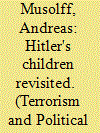

|
|
|
|
|
| Publication |
2011.
|
| Summary/Abstract |
The origins of West German terrorism are closely linked to post-war Germany's problems of dealing with the National Socialist past. The terrorist groups defined themselves as "antifascist" and accused the Federal Republic of Germany, the USA, and Israel of continuing "imperialist" Nazi policy, which was supposed to justify their "armed struggle." On the other hand, the terrorists themselves have been described as "Hitler's children" in the sense that they had adopted key aspects of National Socialist ideology, including anti-Semitism. The article reviews the evidence for such an assessment in the context of Germany's debates about the legacy of National Socialism.
|
|
|
|
|
|
|
|
|
|
|
|
|
|
|
|
| 10 |
ID:
104253
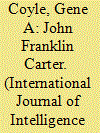

|
|
|
| 11 |
ID:
152647
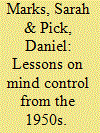

|
|
|
| 12 |
ID:
115080
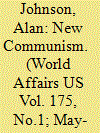

|
|
|
|
|
| Publication |
2012.
|
| Summary/Abstract |
A specter is haunting the academy-the specter of "new communism." A worldview recently the source of immense suffering and misery, and responsible for more deaths than fascism and Nazism, is mounting a comeback; a new form of left-wing totalitarianism that enjoys intellectual celebrity but aspires to political power.
|
|
|
|
|
|
|
|
|
|
|
|
|
|
|
|
| 13 |
ID:
129895


|
|
|
| 14 |
ID:
122437


|
|
|
|
|
| Publication |
2013.
|
| Summary/Abstract |
The time it was written the Universal Declaration of Human Rights
(UDHR) was a very appropriate document. Prepared at the aftermath
of the World War II it was a response to the unspeakable harm suffered
by millions immediately before, at the hands of Nazism and
Communism. Both these regimes, in the countries they ruled treated
people inhumanly with tortures and killings at will. To the outside
world their common refrain, if at all, was that it is their internal affair.
The UDHR tried to reject this attitude of dictatorial and totalitarian
regimes. Thus, human rights of everyone were formulated as independent
of the work one does for living or the place one lives in. Human rights
are the rights of everybody in the world because one is human being.
All people, irrespective of the country or political system, are equally
entitled to them. This way the UDHR was a standard narration of what
human rights mean. Adopted by the United Nations in 1948, the thirty
articles of this declaration is a basic text to understand and uphold
human rights.
|
|
|
|
|
|
|
|
|
|
|
|
|
|
|
|
| 15 |
ID:
123053
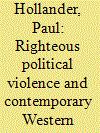

|
|
|
|
|
| Publication |
2013.
|
| Summary/Abstract |
Modern political violence has been increasingly preceded or accompanied by elaborate ideological justifications, devised, in part, by intellectuals motivated by their own political beliefs and commitments. Many idealistic intellectuals have been especially sympathetic toward political movements and systems that have promised to carry out far-reaching social transformations. These movements and systems have often relied upon violent means to accomplish their goals. The political partisanship of many Western intellectuals necessitates a revision of their idealized conception. These issues are dealt with in the context of the intellectuals' attitudes toward Nazism, communism, and present-day Islamic radicalism.
|
|
|
|
|
|
|
|
|
|
|
|
|
|
|
|
| 16 |
ID:
124913
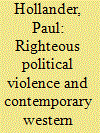

|
|
|
|
|
| Publication |
2013.
|
| Summary/Abstract |
Modern political violence has been increasingly preceded or accompanied by elaborate ideological justifications, devised, in part, by intellectuals motivated by their own political beliefs and commitments. Many idealistic intellectuals have been especially sympathetic toward political movements and systems that have promised to carry out far-reaching social transformations. These movements and systems have often relied upon violent means to accomplish their goals. The political partisanship of many Western intellectuals necessitates a revision of their idealized conception. These issues are dealt with in the context of the intellectuals' attitudes toward Nazism, communism, and present-day Islamic radicalism.
|
|
|
|
|
|
|
|
|
|
|
|
|
|
|
|
| 17 |
ID:
133221
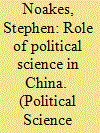

|
|
|
|
|
| Publication |
2014.
|
| Summary/Abstract |
INTELLECTUALS HAVE HISTORICALLY BEEN AMONG the foremost advocates of political reform in repressive autocratic states. During the early decades of the twentieth century, scholars and writers served as chief witnesses to the atrocities arising from events such as the Spanish Civil War, Nazism, and the Stalinist purges. Later, they formed the basis of the samizdat movement that played an integral part in the destruction of European communism.1 Indeed, the leftist intelligentsia of the former USSR and its satellites became some of those regimes' most ardent critics and the instigators of revolutionary political change.2 More recently, intellectuals have led calls for liberalization in the Color Revolutions of central and southern Europe, as well as sub-Saharan Africa and the Middle East, in some cases even transitioning from academic life into new roles as politicians.3 The late Václav Havel in Czechoslovakia and Kosovo's Ibrahim Rugova are just two of the most ready examples.
|
|
|
|
|
|
|
|
|
|
|
|
|
|
|
|
| 18 |
ID:
167766
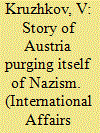

|
|
|
|
|
| Summary/Abstract |
THE WORLD'S main 21st-century objectives include eradication of neo-Nazism and radical nationalism, that harrowing legacy of former turbulent developments.
|
|
|
|
|
|
|
|
|
|
|
|
|
|
|
|
| 19 |
ID:
029750
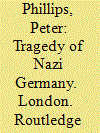

|
|
|
|
|
| Publication |
London, Routledge & Kegan Paul, 1969.
|
| Description |
xi, 241p.Hbk
|
| Standard Number |
710064969
|
|
|
|
|
|
|
|
|
|
|
|
Copies: C:1/I:0,R:0,Q:0
Circulation
| Accession# | Call# | Current Location | Status | Policy | Location |
| 010757 | 943.086/PHI 010757 | Main | On Shelf | General | |
|
|
|
|
| 20 |
ID:
173304
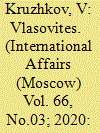

|
|
|